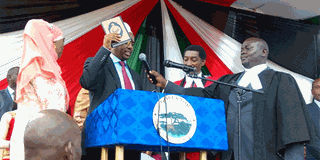Marsabit Governor Mohamud Ali gets elders’ backing to defend seat

Marsabit County governor Mohamud Ali sworn in on August 21, 2017.
Marsabit County Governor Mohamud Ali’s bid for a second and final term has received a shot in the arm after he was endorsed by the Borana Council of Elders.
He was installed by over 140 elders from Saku, Sololo and Moyale sub-counties, with high-profile political and community leaders from Isiolo and Tana River counties attending.
“I am more than joyous for the Borana Council Elders to endorse me to bear the entire community’s flag and to lead this county for the second term. I now ask for the support of other communities too,” Governor Ali said.
Speaking at a rally in Sololo, he invited like-minded leaders to join him in wooing the county’s voters to support him so as to complete his development projects and the campaign pledges he made in 2017.
He cited numerous challenges, including endemic insecurity, saying they had hampered services in his first term, but he was optimistic that he would honour his pledges and achieve his goals if re-elected.
Bura MP Ali Wario, Tana River governor aspirant Hussein Dadho and Isiolo Woman Rep Rehema Jaldesa, who also attended the endorsement ceremony, lauded Governor Ali for being endorsed by the elders.
Ms Jaldesa challenged the Borana community to uphold their unity before they go out to woo other communities to vote for one of their own.
She said that for the community to bargain countywide, they needed a gubernatorial candidate to act on their behalf, and they had to seal all the cracks in their house.
This came as three other governor candidates emerged from the Borana community.
Pundits argue that the supremacy war within the Borana Council of Elders (BCE) in Marsabit County was threatening to derail efforts by Governor Ali to ring-fence the over 141,730 votes ahead of the August General Election.
Come to a roundtable
Also likely to complicate matters is the emerging jostling for the governor’s seat by other candidates and the discord in the Borana community.
BCE chairperson Galma Dabaso explained that before Governor Ali’s endorsement they had unsuccessfully persuaded Agriculture and Food Authority Director-General Kello Harsama, Prof Tuqa Jirma and Wario Guyo, who are also eyeing the seat, to come to a roundtable and help the community pick the most preferred candidate.
The three also held a parallel meeting in Sololo town that was overseen by a splinter Baliti Borana Council of Elders (BBCE) in the search for a gubernatorial candidate.
Their meeting, which lasted over 12 hours, saw Mr Harsama endorsed, having garnered 79 votes, followed far behind by Mr Guyo with five and Prof Jirma with two. One vote was spoiled.
After he was endorsed, Mr Harsama said he was well placed to fight it out with Treasury CS Ukur Yatani, who is also expected to get a nod from the Gabbra community to contest the governor’s seat.
He cited his vast administrative experience, having served as a teacher, district officer, district commissioner and county commissioner, other senior government positions, for over 20 years.
“Our county continues to sink in nearly all spheres because of bad governance and corruption and it is now time to fix all the wrongs. The only way to do this is by now supporting my candidature to capture the governor’s seat,” Mr Harsama said.
He said he has a genuine desire to address the myriad of challenges bedevilling the county.
The Borana and Gabbra ethnic groups constitute the majority in Marsabit. The third-largest group are the Rendille.
In the August elections, all three communities have fronted a candidate to vie for the governor’s seat.
The minority Sakuye have also fronted one of their own for the same seat.
Marsabit comprises 14 communities. The others include the Burji, Turkana, Garre, Samburu, Dassenach and El Molo Wayyu.
The ethnic groups’ contemporary political significance comes down to their size, although the Burji, a minority but largely wealthy community concentrated in Marsabit Central, also play a pivotal role in influencing the county’s political tides.
The other smaller communities play limited roles in the county's politics.





